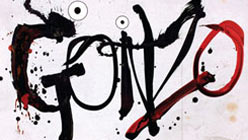The choice Alex Gibney faced when he set to making a documentary about writer and counterculture icon Hunter Thompson was whether to pierce the manic myth that had grown around his subject, or to carve a monument to it. He chose the latter, and a good many people will have a rollicking good time at Gonzo: The Life and Work of Dr. Hunter S. Thompson. But a smaller but still sizable number will detest the multitude of self-indulgences on display, with Gibney’s outstripping Thompson’s.
One gets a bad feeling about the filmmaker’s instincts early on when he cuts to footage of a network TV anchor announcing Thompson’s gunshot suicide in 2005. His intent, obviously, is to convey to younger moviegoers that Thompson was such a well-known figure that his passing made the evening news. But using an Establishment voice to establish Thompson’s importance is so counterintuitive as to be imbecilic. From the beginning of his career, the lanky journalist — who did his best work for the scruffy San Francisco music and culture magazine Rolling Stone — was a subversive who delighted in challenging the values and complacency of straight America. He may have changed over the years to the point where he basked in mainstream approbation, but that’s not how Gibney wants us to see this clip.
Another opportunistic but ill-advised move is bringing Johnny Depp in to read Thompson’s prose. Gibney didn’t pick his name out of a hat — Depp played Thompson in the 1998 film Fear and Loathing in Las Vegas — but the choice signals the filmmaker’s intention to trade on every pop culture marker associated with Rolling Stone’s ace writer. Sure enough, Gibney later pulls entire sequences from Terry Gilliam’s movie (and one from Where the Buffalo Roam, starring a cartoonish Bill Murray). Now Depp is a fine actor and he’s here to serve Thompson, but he can’t help but steal the spotlight, even briefly, while underscoring the writer’s celebrity status.
The best parts of Gonzo are the lengthy segments covering Thompson’s early career, before he degenerated into a caricature (or, if you prefer, was entrapped by his image) and before the film succumbs to chronicling the legend instead of the man. The sections on Thompson’s book about the Hells Angels, which established his reputation, and his run for sheriff of Aspen, which reminds us that he was an original thinker, are completely engrossing.
The Colorado sequence (and the rest of the documentary from here on) is marred by the pretentious use of hit songs in overly literal but nonsensical and show-offy ways. Lou Reed’s “Walk On the Wild Side” says New York City to me, even if everyone in the country was listening to it at the time. Only someone with money to burn and an ego the size of the Goodyear blimp would choose to use it in a section on Aspen.


